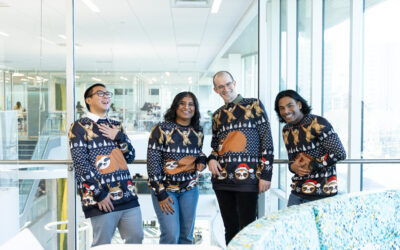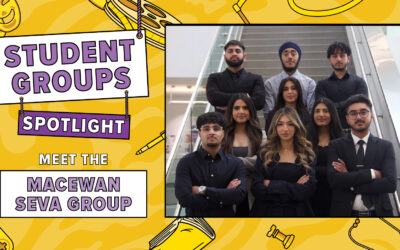Welcome to Student Group Spotlight! Every month, we will feature a different student group to demonstrate the many diverse groups we have at MacEwan and how they all contribute to a vibrant, thriving community on our campus.
Meet the MacEwan Wildlife Club (MWC)! We sat down with their team to discuss the experience opportunities they offer, how to get involved in conservation efforts, and what kind of events they host.
SAMU: Hi, welcome to the SAMU Student Groups Spotlight! Let’s get started by telling me a bit about yourselves.
Cameron: Hi, my name is Cameron, and I’m in my fifth year of the Bachelor of Science program, majoring in biology and minoring in psychology.
Daylen: Hi, I’m Daylen. I’m in my fourth year of the Bachelor of Science program, majoring in biology and minoring in economics.
SAMU: Nice to meet you two. Can you explain what MWC is and what you do?
Daylen: I’m the President of the MWC, and we are a biology-focused group. We work to provide experiences for students that take them outside of the classroom, allowing them to interact with nature in new and exciting ways and gain valuable experience for potential future careers.
Cameron: I’m the Vice President of the MWC, and our club is essential in helping students connect with other students and professors. We have provided many opportunities for students to put themselves out there and start networking, which has greatly benefited our group.
SAMU: Why did you decide to start MWC? What has been your favourite part about being a member?
Cameron: It started when a group of us went to the Bamfield Marine Sciences Centre in Vancouver for a school trip. While there, we talked about how we could make conservation more of a topic at MacEwan and broaden our options to get experiences we weren’t getting in the classroom. We decided to start this club, and Daylen took the lead to get it approved. After we became a Student Group, we got approved to be an actual chapter of the Wildlife Society, which has amazing benefits.
Daylen: We have been working hard to provide new and exciting opportunities to get students out of the classroom and connect them with nature in a hands-on way.
Cameron: Yeah, we enjoy hosting unique events and promoting various opportunities that weren’t an option before our group formed. My favourite part so far has been organizing and offering diverse events and seeing students excited to engage in them.
SAMU: Wow, that sounds amazing. How does your group work to assist existing conservation efforts?
Daylen: We have been assisting groups that do conservation by sending volunteers to Nature Alberta or the Edmonton & Area Land Trust (EALT). Two of our alumni are working with EALT to assist in their land trust activities, where they have been given allotments of land and have been working to rehabilitate the land back to neutral conditions. We are also working to get students involved on campus with conservation. We just had a Bee Hotel workshop to inform about native pollinators, and we are hoping to have some Bee Hotels up on campus if everything works out. We have also been working on the Tower Gardens project; if you walk by the clock tower down in the basement, we have greenery growing inside, which has been lovely to see, especially with all the construction around.
Cameron: The most significant part of conservation is outreach programs and getting people to know what’s happening in the community to care about conservation. A lot of people want to do better, but they don’t know where to start. Our club has been able to bridge that gap because even people who aren’t in conservation classes have been able to learn and spread the word to their friends, creating a domino effect of education and care.
SAMU: That is great to hear! What kind of career opportunities does this field offer? How do you connect students with the industry?
Daylen: There are a lot of industry options. You can always do consulting or general conservation work with a group like EALT, and there’s lots of volunteering available. Some professors on campus have been doing research for conservation efforts, so there are always opportunities on campus for students to gain research experience. We work to connect students with professors and supervisors, and as a chapter of the Wildlife Society, they have job opportunities that we share with our members.
Cameron: There are a lot of directions you can go. It’s very collaborative of different fields where you could research molecular biology, look at genomes, or go out into the field and record data. Even within research projects, there are many different fields at play. The events we offer are an excellent way for people to see if they are interested in conservation before they take a class or declare their major and minor. Getting hands-on experience is crucial to see if the field you are interested in is the right spot for you.
SAMU: Could you explain what the Wildlife Society is and how you became a chapter?
Daylen: We are a student branch of the Alberta Chapter of the Wildlife Society. It’s a network of interconnected individuals working to inspire and empower each other to engage in the conservation of wild animals and their habitats. They host conferences for people to display research, and it’s been an excellent way for us to find new opportunities to share with our group and participate in different experiences. We’ve had the opportunity to chat with the University of Alberta student chapter and hope to do a poster session and career fair with them in the future.
Cameron: Yeah, they offer a lot of volunteer opportunities and mentorships for sustainable practices and other areas. Being a chapter has opened a lot of doors for us; there are many things we wouldn’t have been able to do without them, like allowing students to get out into nature and gain hands-on experience.
SAMU: What kind of events and workshops do you host? What has been your favourite or most memorable event?
Cameron: We have hosted a wide variety of events like nature walks through the river valley, a trip to Elk Island, bio blitz, a fish identification course, the bee hotel workshop and more. We plan to host a trivia night since we went to the UofA quiz bowl and took first place! My favourite event so far was the Owl Banding event. We got to go out with researchers at the Beaver Hill Bird Observatory, where they had placed low hanging nets in trees and played mating calls to catch Owls. The nets were very gentle; when they caught them, they put a band on the Owls to track them for migration, which is very important in conservation efforts so we know how many Owls are out there.
Daylen: Yeah, the Owl Banding was definitely my favourite. We observed the process of tracking owls through migration patterns, and were lucky enough to see both a northern pygmy and a great horned owl! I also hope to attend the Wildlife Society’s future conference and get other students out there! I haven’t been before, but I have heard great things from people who have been.
SAMU: Wow, that’s a wide variety of events! What do you hope students learn from your events?
Daylen: I hope they gain an appreciation for nature. I would love to see more people at MacEwan who like to go into nature and want to learn how they can help conserve and care for the environment. I also want people to get more involved and for those who really care about conservation to be able to find the experience they might need.
Cameron: I want people to learn how important it is to volunteer, get your name out there and gain experience. Being in my last year and looking at job applications, I’ve seen positions that require a few years of experience, so it’s vital to have experience you can put on your resume. Through that experience, you can figure out what field you like before starting your career.
SAMU: How has being involved in this Student Group shaped your university experience?
Cameron: The club has made the university a lot more fun. There has been a great social aspect, and almost every biology class I’ve been in now has people I know from the group, and I have friends and people I’m looking forward to chatting with. It’s also been great for resume building; it’s impacted me by allowing me to gain experience I wouldn’t have gotten through MacEwan otherwise. It’s been fantastic for networking, getting closer with professors, and hearing their suggestions on how to get involved and what steps to take next.
Daylen: Yeah, it’s broadened my horizons, and I’ve learned a lot along with this process. It’s been helpful in making connections and creating a good group of support outside the club in hopes that people can take over and continue the club. It’s been a fantastic experience overall.
SAMU: What would you say to someone considering joining a student group?
Daylen: I definitely recommend joining a group, especially with the social scene of university getting back on track. It’s really important for people to join clubs they are interested in. It’s the best way to gain new experiences that you might not have otherwise at MacEwan.
Cameron: It might be daunting to walk into a group event and not know anybody, but that’s the best way to make friends. Everyone has started in the same place and did not know anyone before joining their club, and I think that the best outlook is to know that everyone was once in the same place, and it has been a great outcome for everybody. You also don’t have to dedicate a lot of time to Student groups; you don’t need to go to every event and put in all your extra time. If you can only go to a few, that’s okay. Just do what you can.
You can connect with MacEwan Wildlife Club on social media through @macewan.wildlife
Follow SAMU on social media through Instagram (@sa_macewan), Twitter (@SAMacEwan), and Facebook (Students’ Association of MacEwan University) to stay up to date on the latest events, programs, and services from your students’ association.



